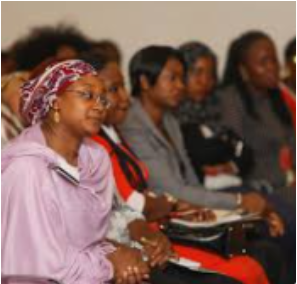The perceived traditional role of women in Nigerian history as mothers and child bearers has been a highly constrained, relegated role for many decades. Many traditional societies in Nigeria were too shortsighted to see the relationship between a progressive society, and the quality of womanhood/motherhood in that society. Experience has shown that it takes a well-educated and/or economically empowered woman to nurture responsible sons and daughters, who also possess a success mindset. This is the grand dilemma of Nigerian society so far.
But is it possible that traditional societies in Nigerian history never allowed women to play any significant role in the society? Quite on the contrary; it was not so. History has given a glimpse into legends of influential women, who have helped to shape the history of ancient kingdoms in Nigeria. Social structures that empowered women to be leaders and resource controllers have also existed in certain traditional societies. We shall be investigating such cases in this article.
Women in Nigerian Society: Pushing for Greater Representation is Critical
Women in Nigerian society can now demand for their basic human right to be educated. There is clear recognition of the contributions of educated and empowered women to the rapid socio-economic development worldwide. And as such, that basic right to education (for all genders) must no longer be ignored. This right has been adopted since 1948 under the Universal Declaration on Human Rights (UDHR).
A 2014 report further indicated how female education has a significant impact on the emergence of a stable, prosperous and healthy nation. Such prosperous societies would naturally birth productive and empowered citizens. In fact, a positive correlation was observed between the number of girls enrolled in primary school, the Gross National Product (GNP), and an increased life expectancy. For this reason, school enrollment is taken as the biggest component of human capital development in any human society. Furthermore, educating females in society would naturally reduce gender gaps. Yet again, it would encourage the independence and increased sense of responsibility of such women. And to this end, the National Policy on Education additionally stipulates that all Nigerian children have a right to access education. This is without regard to their gender, religion, and/or disability.
Societal Roles of Women in Nigerian History Before British Colonization
Women in Nigerian history have functioned in roles dictated by cultural, religious, and geographic factors (past and present). Before the British government established Protectorates across the Nigerian landscape in the 1800s, women were actively involved in social and economic activities. It was a common practice to see division of labour between the genders. In many traditional societies, women were typically in charge of subsistence agriculture, food processing, cooking, pottery, mat weaving, and other crafts.
Women also had access to, and ownership of land either by marriage, or by inheritance from their parents. Yet again, women were also in charge of trade. Trading created huge opportunities for women to become prosperous, and even acquire chieftaincy titles. Two such notable women leadership roles in Yorubaland include the Iyalode and Iyaloja. Both of them are prominent and powerful members of the traditional ruling council that work closely with the Oba (king).
Additionally, legends of powerful and highly influential women in Hausa and Yoruba ancient histories also exist. These women ruled as kings and warriors or performed uncommon feats during their lifetime. They include some past rulers of the kingdoms of Oyo, Ondo, Daura, and Zaria (such as Queen Amina of Zaria); and historical figures such as Moremi. Similarly in Edo and Yoruba societies, the queen mother is a person entrusted with a considerable degree of respect and power. A queen mother will usually have her own palace, and lord it over other subordinate titleholders.
Older women of a household also had a considerable degree of control over the children, and younger members of the family. Such was the case of the first-born female in native Igbo culture, popularly referred to as the Ada. Yet again, Igbo societies ran a dual-sex system of governance – where women-led organizations operated side by side with men-led organizations to control the community. Thus, there was harmony and unity. At the top of the women-led hierarchy existed a prominent woman leader called the Omu (‘mother of the society’). The Omu had authority on issues that affected both men and women; and she controlled all local trade and the marketplace. The authority of the Omu extended to cover decisions as critical as waging wars.
How British Administration Disrupted the Gender Roles of Women in Colonial Nigeria
The unfavorable treatment of women in traditional Nigerian society became a full-blown problem during the 20th Century era of British colonization. Much of the prominent titles and privileges of women were relegated by the British system of controlling native societies through men. Male chiefs were appointed by the British colonial administration to govern and collect taxes.
Furthermore, Nigerian men were favored by the British government and companies over females, in the production and sale of cash crops. Thus, the men became richer, and were able to acquire lands more easily. Women were excluded, limiting them (in earnings and power) to carrying out just subsistence farming. To make it worse, boys were favored above girls to obtain Western education. The British government deemed it fit to reserve most of the jobs introduced during the colonial era for men (who were seen as more productive).
Cultural and Religious Denial of Rights to Women in Nigerian History
Nigerian women have faced several cultural and religious restrictions and maltreatments over the decades. In northern Nigeria, Islam prescribes that a woman is to be totally submissive to her husband and is often kept in seclusion. Such women are not even permitted to go anywhere or embark on anything without the permission of their husbands. In some cultures (especially southern Nigeria), the widow of the deceased is often maltreated during so-called ‘widowhood rites’. She may even be denied her husband’s inheritance.
In addition to these challenges, Nigerian women also face many gender problems. Namely underage marriage, high maternal mortality rate, female genital mutilation, domestic violence, rape, forced prostitution, poverty, poor access to healthcare, amongst others. For instance, it has been observed that across Nigeria, girls and women are generally given less food than their male counterparts. But the same females are made to undertake more domestic labor than the males. Yet again, females are forced to be more restricted in movement than males for various (often selfish) reasons by family members. As we speak, Nigeria ranks 168th out of 191 countries worldwide in the Gender Inequality Index.
Attaining Gender Equality in Nigerian Society
It is interesting to know that Nigerian women were at the forefront of activities to decolonize Nigeria between the 1940s and 1950s. Women in southern Nigeria took up the fight to ease out the British government with uncommon zeal. Aside from organizing protests, women groups such as the Nigerian Women’s Union and the National Council of Women’s Societies were established in Nigeria. During that period, the women of southern Nigeria acquired the right to vote. However, it was not until 1979 that all Nigerian women were finally allowed to exercise their voting rights. Nigerian women are still struggling to have a fair representation in politics till this day. Additionally, they are often threatened with political intimidation and/or violence.
But fortunately, times are changing. And modern education in Nigeria (and worldwide) has empowered more women to take up significant roles in the professional, political, social and economic spheres. The stereotype of male dominance is gradually giving way to a gender-neural and cooperative society, where women can contribute better to nation building.
G







